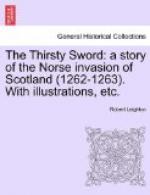In the meantime King Alexander, having received Kenric’s early warning of the coming of the Norsemen, had with many Scots and English noblemen taken up his residence in Stirling Castle, there to await further news.
One day in September he was out with a hawking party upon the lands which, fifty years afterwards, became known to the world as the field of Bannockburn, when suddenly a most beautiful maiden with blood-red hair threw herself before his horse.
“May it please your Majesty,” said she, “to hear your servant’s petition?”
“Who, then, are you, my pretty maid?” said the King.
“I am a maid of Bute, your Majesty, and a faithful vassal of my lord Earl Kenric of that isle. And I have come to tell you that the Norsemen have landed on your shores. They have taken our castle of Rothesay. They have harried your lands of Lennox. They are approaching upon Stirling. And oh, your Majesty, of your mercy I implore you to give speedy succour to your injured subjects by driving this enemy from our midst!”
“How came you here?” asked the King.
“I was carried off as a prisoner from Rothesay by the tyrant Roderic of Gigha, who hath been sent by King Hakon to lay waste the shores of the Clyde. He carried me as far as Loch Long in his ship. But there I escaped and found my way hither to inform your Majesty of these disasters.”
“Roderic of Gigha?” echoed the King. “So, ho, and ’tis he who hath taken Bute? By St. Andrew, but he shall not long enjoy his conquests.
“My lords,” he added turning to his companions, “methinks the maid speaks truth. Now turn we back to Stirling and cease this sporting, for there are higher duties to perform. Come, my lords, let us at once muster a goodly army, and march against these bold sea wolves ere they have gone too far.”
But ere the king had time to do more than learn the extent of the invasions, Roderic and Magnus had returned to their ships. Alexander, however, soon learned that Hakon himself had entered the Clyde with his armaments, and thereupon there ensued an interchange of messages between the two monarchs. A truce was agreed upon until terms might be arranged. It was the object of the King of Scots to so delay negotiations, that every day might give him more time to concentrate his army; and as the autumn was drawing to a close, it brought the Norwegians a nearer prospect of wreck and disaster from the winter storms.
Alexander made such moderate demands that it was apparent he was not fully prepared to resist the fleet and army of Norway. He had no standing army. He had never been engaged in any warlike affair. He sent word to the Norse king signifying that he would be content to retain the mainland of Scotland and the islands inclosed by it — Arran, Bute, and the two Cumbraes — and it appears that he was willing to have given up to Norway the whole of the isles of the Hebrides. These terms, so advantageous to Hakon, were, fortunately for Scotland, rejected. The proud master of the invading force would give up nothing coming within his claims. It then was observed that Alexander became shy of further treating, and that a force was gradually collecting upon the heights overlooking the Cunningham coast.




